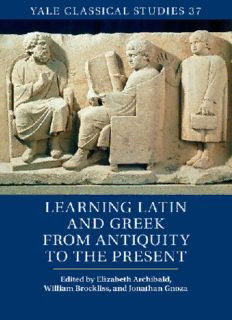
Learning Latin and Greek from antiquity to the present PDF
Preview Learning Latin and Greek from antiquity to the present
LEARNING LATIN AND GREEK FROM ANTIQUITY TO THE PRESENT This volume provides a unique overview of the broad historical, geographical, and social range of Latin and Greek as second languages. It elucidates the techniques of Latin and Greek instruction across time andplace,andthecontrastingsocio-politicalcircumstancesthatcontrib- uted to and resulted from this remarkably enduring field of study. Providing a counterweight to previous studies that have focused only ontheexperienceofelitelearners,thechaptersexploredialoguesbetween center and periphery, between pedagogical conservatism and societal change, between government and the governed. In addition, a number of chapters address the experience of female learners, who have often beenexcludedfromormarginalizedbyearlierscholarship. elizabeth p. archibald is Visiting Teaching Professor at the PeabodyInstituteoftheJohnsHopkinsUniversity.Herresearchfocuses on early medieval education, medieval Latin, and the reception of classicaltextsintheMiddleAges. william brockliss is Assistant Professor of Classics at the University of Wisconsin-Madison. His research encompasses the inter- actions between literature and the natural environment, the history of classical pedagogy, and the classical tradition. The latter interest is reflected in his previous Yale Classical Studies volume, Reception and the Classics, Cambridge (2011) edited with Pramit Chaudhuri, Ayelet Haimson-Lushkov,andKatherineWasdin. jonathan gnoza is an adjunct instructor in the Medieval and RenaissanceCenteratNewYorkUniversity.Hehaspreviouslycontrib- utedasatranslatortoTheVirgilianTradition:theFirstFifteenHundred Years,(2008). YALE CLASSICAL STUDIES VOLUME XXXVII LEARNING LATIN AND GREEK FROM ANTIQUITY TO THE PRESENT edited for the department of classics by ELIZABETH P. ARCHIBALD VisitingTeachingProfessoratthePeabodyInstitute oftheJohnsHopkinsUniversity WILLIAM BROCKLISS AssistantProfessorofClassics,UniversityofWisconsin-Madison JONATHAN GNOZA AdjunctProfessorintheMedievalandRenaissanceCenter, NewYorkUniversity UniversityPrintingHouse,CambridgeCB28BS,UnitedKingdom CambridgeUniversityPressispartoftheUniversityofCambridge. ItfurtherstheUniversity’smissionbydisseminatingknowledgeinthepursuitof education,learningandresearchatthehighestinternationallevelsofexcellence. www.cambridge.org Informationonthistitle:www.cambridge.org/9781107051645 ©CambridgeUniversityPress2015 Thispublicationisincopyright.Subjecttostatutoryexception andtotheprovisionsofrelevantcollectivelicensingagreements, noreproductionofanypartmaytakeplacewithoutthewritten permissionofCambridgeUniversityPress. Firstpublished2015 PrintedintheUnitedKingdombyClays,StIvesplc AcataloguerecordforthispublicationisavailablefromtheBritishLibrary LibraryofCongressCataloginginPublicationdata LearningLatinandGreekfromantiquitytothepresent/editedfortheDepartmentofClassicsby ElizabethP.Archibald,WilliamBrockliss,JonathanGnoza. pages cm Includesbibliographicalreferencesandindex. isbn978-1-107-05164-5(Hardback) 1. Latinlanguage–Studyandteaching–History. 2. Greeklanguage–Studyandteaching–History. I. Archibald,ElizabethP. II. Brockliss,William. III. Gnoza,Jonathan. PA74.L432014 488.0071–dc23 2014002419 isbn978-1-107-05164-5Hardback CambridgeUniversityPresshasnoresponsibilityforthepersistenceoraccuracyof URLsforexternalorthird-partyinternetwebsitesreferredtointhispublication, anddoesnotguaranteethatanycontentonsuchwebsitesis,orwillremain, accurateorappropriate. Contents List of illustrations page vii Notes on contributors viii Acknowledgements xii 1. Introduction: “Learning me your language” 1 Elizabeth P. Archibald,William Brockliss, Jonathan Gnoza 2. Papyri and efforts by adults in Egyptian villages to write Greek 10 Ann Ellis Hanson 3. Teaching Latin to Greek speakers in antiquity 30 EleanorDickey 4. Servius’ Greek lessons 52 FélixRacine 5. Pelasgian fountains: learning Greek in the early Middle Ages 65 Michael W. Herren 6. Out of the mouth of babes and Englishmen: the invention of the vernacular grammar in Anglo-Saxon England 83 Jay Fisher 7. First steps in Latin: the teaching of reading and writing in Renaissance Italy 99 RobertBlack 8. The teaching of Latin to the native nobility in Mexico in the mid-1500s: contexts, methods, and results 118 AndrewLaird 9. Ut consecutivum under the Czars and under the Bolsheviks 136 Victor Bers v vi Contents 10. Latin for girls: the French debate 145 Françoise Waquet 11. Women’s education and the classics 156 Fiona Cox 12. “Solitary perfection?” The past, present, and future of elitism in Latin education 166 KennethJ. Kitchell,Jr. 13. Exclusively for everyone – to what extent has the Cambridge Latin Course widened access to Latin? 184 Bob Lister 14. Epilogue 198 Emily Greenwood Bibliography 209 Index 232 Illustrations Fig. 2.1: P.Petaus121,TMno.12630.Inv.Nr.Cologne328,Recto Permissionforthisandthetwofollowingimages grantedbyDr.RobertDaniel,Kustos,Papyrus- Sammlung,Cologne. page16 Fig. 2.1a: P.Petaus 77.18, TM no. 12687. Inv. Nr. Cologne 310 b, Recto 17 Fig. 2.1b: P.Petaus 60.42, TM no. 8762. Inv. Nr. Cologne 312, Recto 17 Fig. 2.2: SB xiv 11585, TM no. 14491, P.Corn. Inv. i 11, Recto. Image digitally reproduced with the permission of the Papyrology Collection, Graduate Library, University of Michigan. 24 Fig. 5.1: Vienna, Österreichische Nationalbibliothek, MS 795, f. 19r. Permission granted by Österreichische Nationalbibliothek. 71 Fig. 5.2: Schaffhausen Stadtbibliothek, MS Gen. 1, p. 137. Permission granted by Schaffhausen Stadtbibliothek and Codices Electronici AG, www.e-codices.ch. 71 Fig. 5.3: Metz,BibliothèqueMunicipale,MS145,f.204,fromJ.Becker, TextgeschichteLiudprandsvonCremona.Munich,1908,Taf.i. (Theoriginalmanuscriptsofthisandthenextimage weredestroyed;thereproductionsarefrompublicdomain works.) 72 Fig. 5.4: Dresden, Sächsische Landesbibliothek, MS A 145b, f. 1r.; from Alexander Reichardt, Der Codex Boernerianus. Der Briefe des Apostels Paulus. Leipzig, 1909. 74 Fig. 5.5: Leiden, Universiteitsbibliotheek, B.P.L. 67, f. 32v. Permission granted by Leiden, Universiteitsbibliotheek. 79 Fig. 13.1: Cambridge Latin Course Stage 21 model sentence: faber primus statuam deae Sulis faciebat. Reproduced with the permission of University of Cambridge School Classics Project. 189 vii Notes on contributors elizabeth p. archibald is Visiting Teaching Professor in the Department of Humanities at the Peabody Institute of the Johns Hopkins University. Her research deals with various aspects of the history of Latin education in the early Middle Ages. victor bers isProfessorofClassicsatYaleUniversity.Hispublications include Greek Poetic Syntax in the Classical Age (1984), Speech in Speech: StudiesinIncorporatedOratioRectainAtticDramaandOratory(1997), andGenosDikanikon:AmateurandProfessionalSpeechintheCourtrooms of Classical Athens (2009). robert black is Professor of Renaissance History at the University of Leeds.HisbooksincludeBenedettoAccoltiandtheFlorentineRenaissance (1985), Studio e scuola in Arezzo durante il medioevo e il rinascimento (1996), Humanism and Education in Medieval and Renaissance Italy (2001), Education and Society in Florentine Tuscany (2007), and Studies in Renaissance Humanism and Politics (2011). Together with Louise GeorgeClubb,hehaswrittenRomanceandAretineHumanisminSienese Comedy (1993), and with Gabriella Pomaro, Boethius’s Consolation of PhilosophyinItalianMedievalandRenaissanceEducation(2000).Hehas edited Renaissance Thought: A Reader (2001) and The Renaissance: Crit- ical Concepts in Historical Studies, 4 vols. (2006). His new biography, Machiavelli,waspublishedinAugust2013.In2014,hehasbeenRobert Lehman Visiting Professor at Villa I Tatti, the Harvard University Center for Italian Renaissance Studies in Florence, Italy. william brockliss is Assistant Professor of Classics at the University of Wisconsin-Madison. His previous publications include the volume Reception and the Classics: Interdisciplinary Studies (Cambridge Univer- sity Press, 2012; Yale Classical Studies 36), which he co-edited with Pramit Chaudhuri, Ayelet Haimson-Lushkov, and Katherine Wasdin. viii
Description: